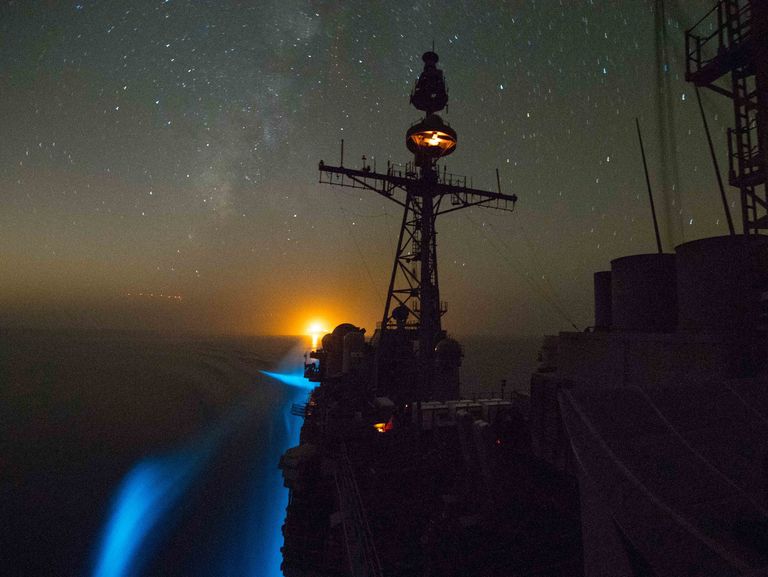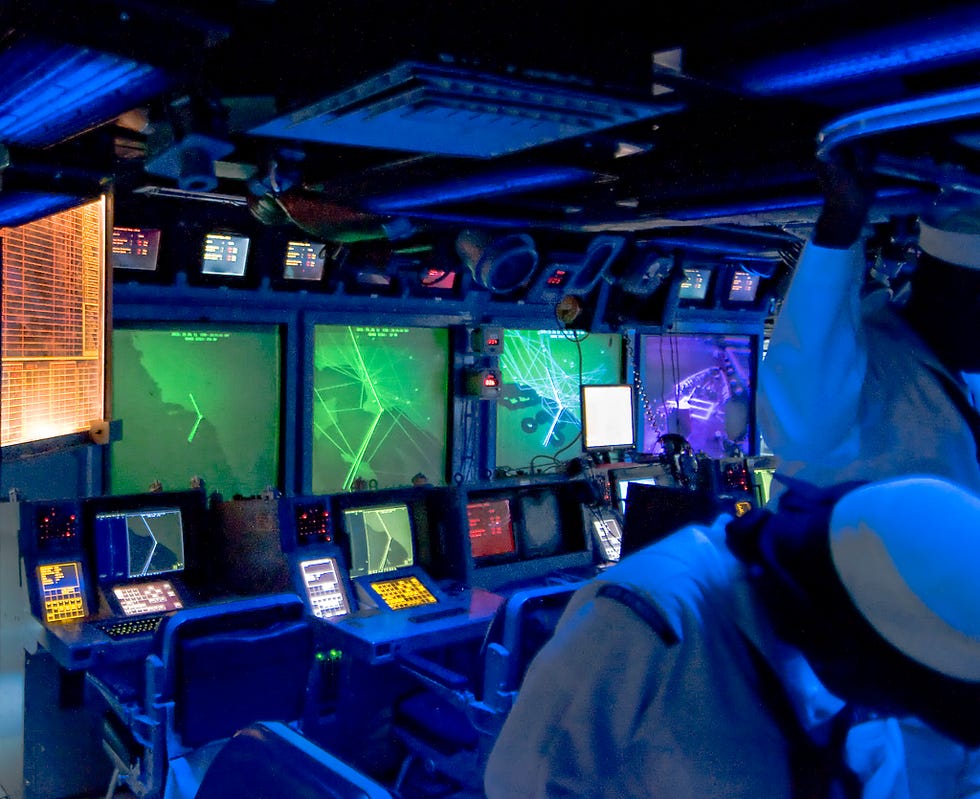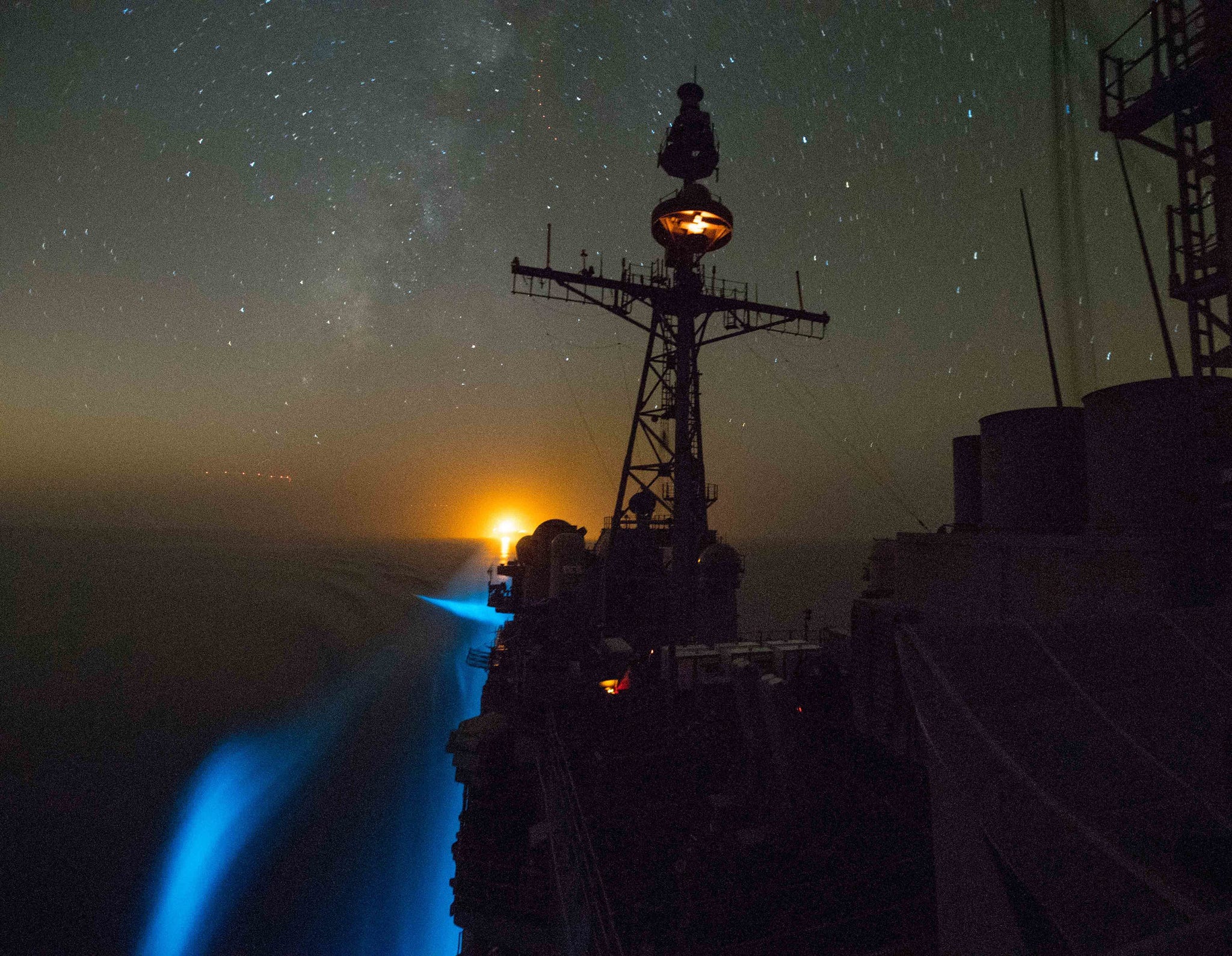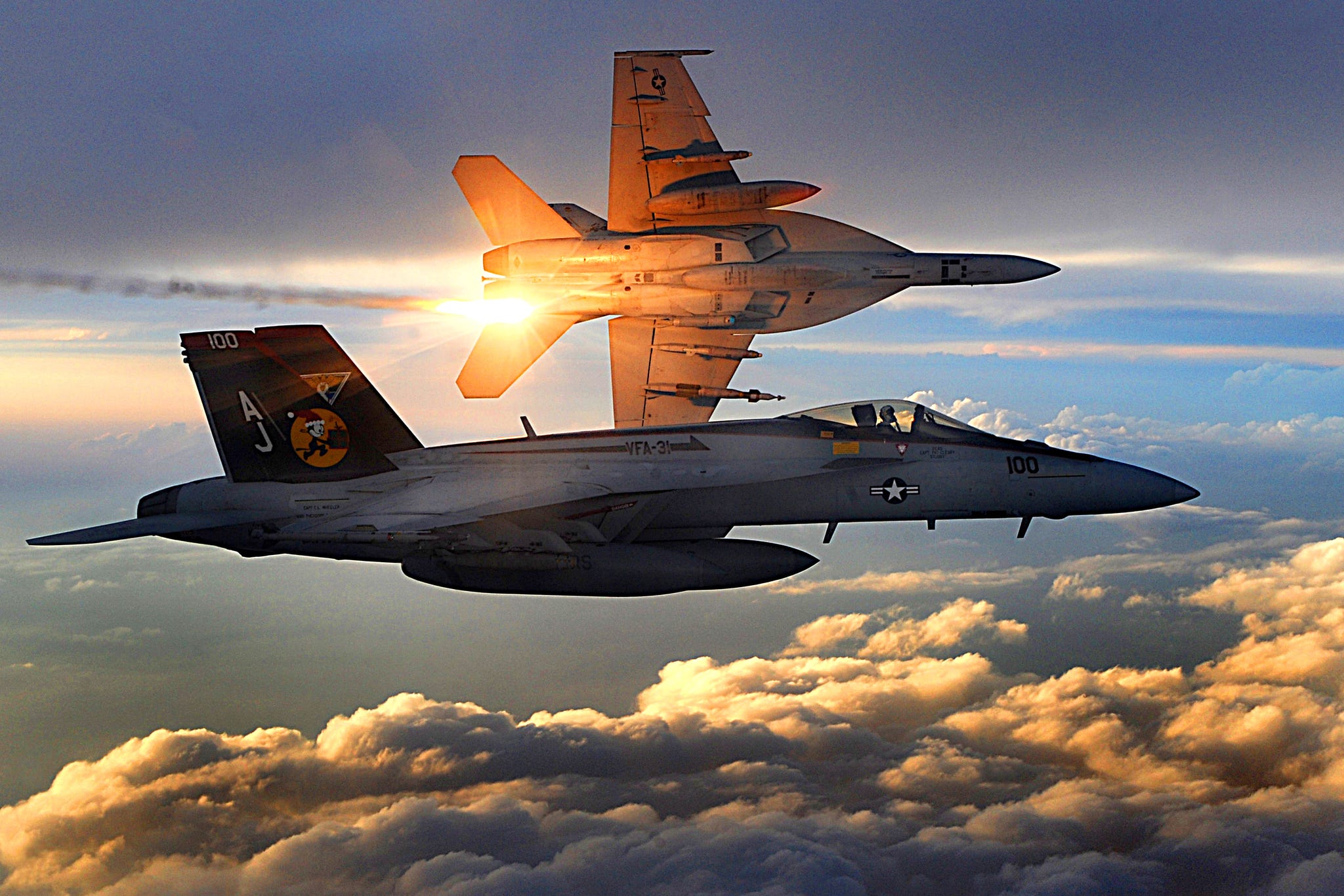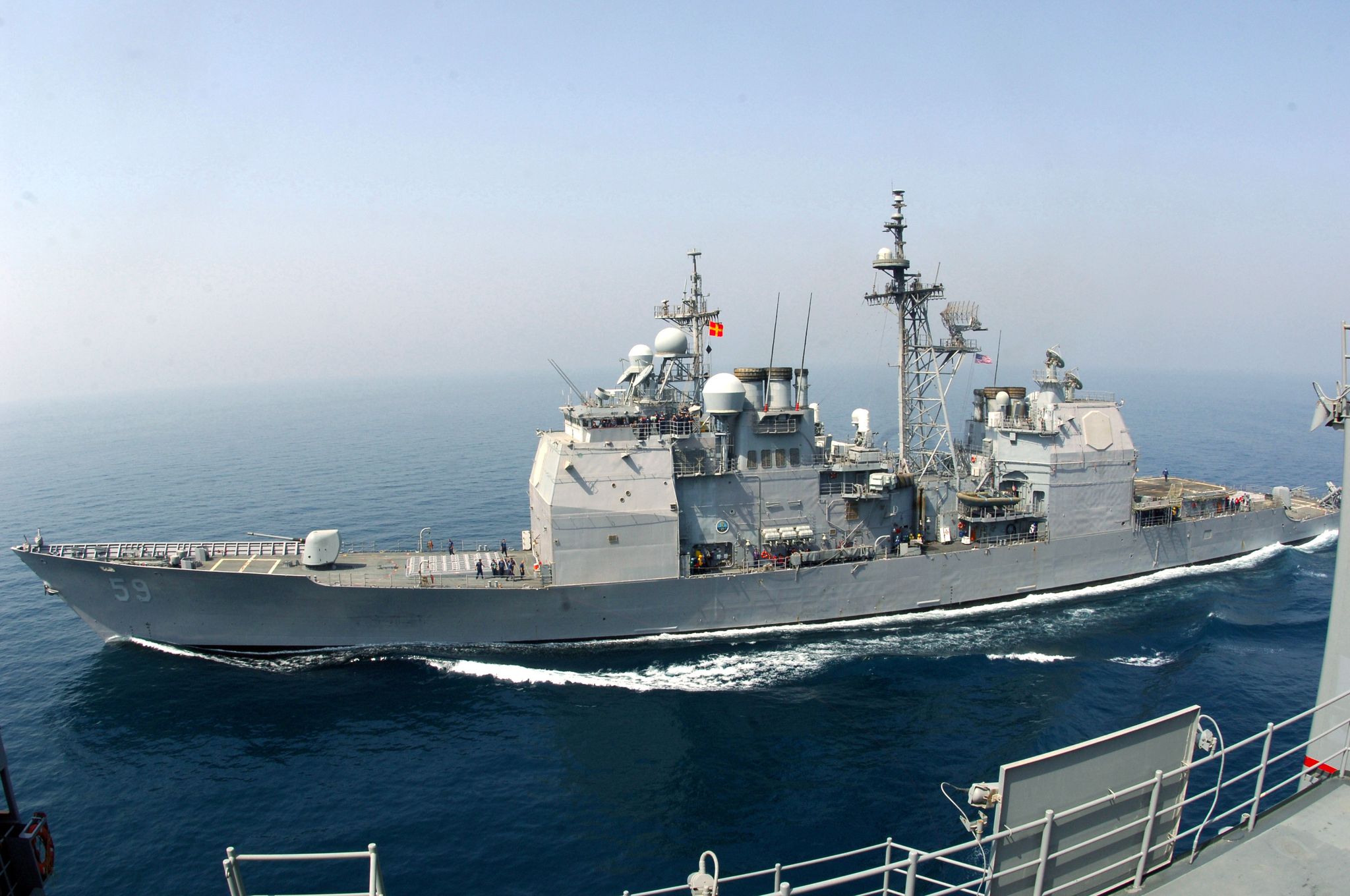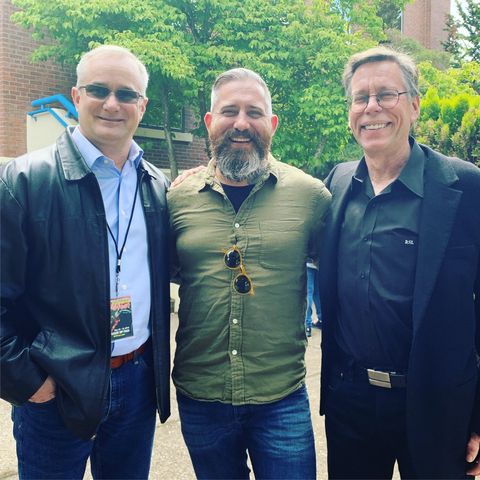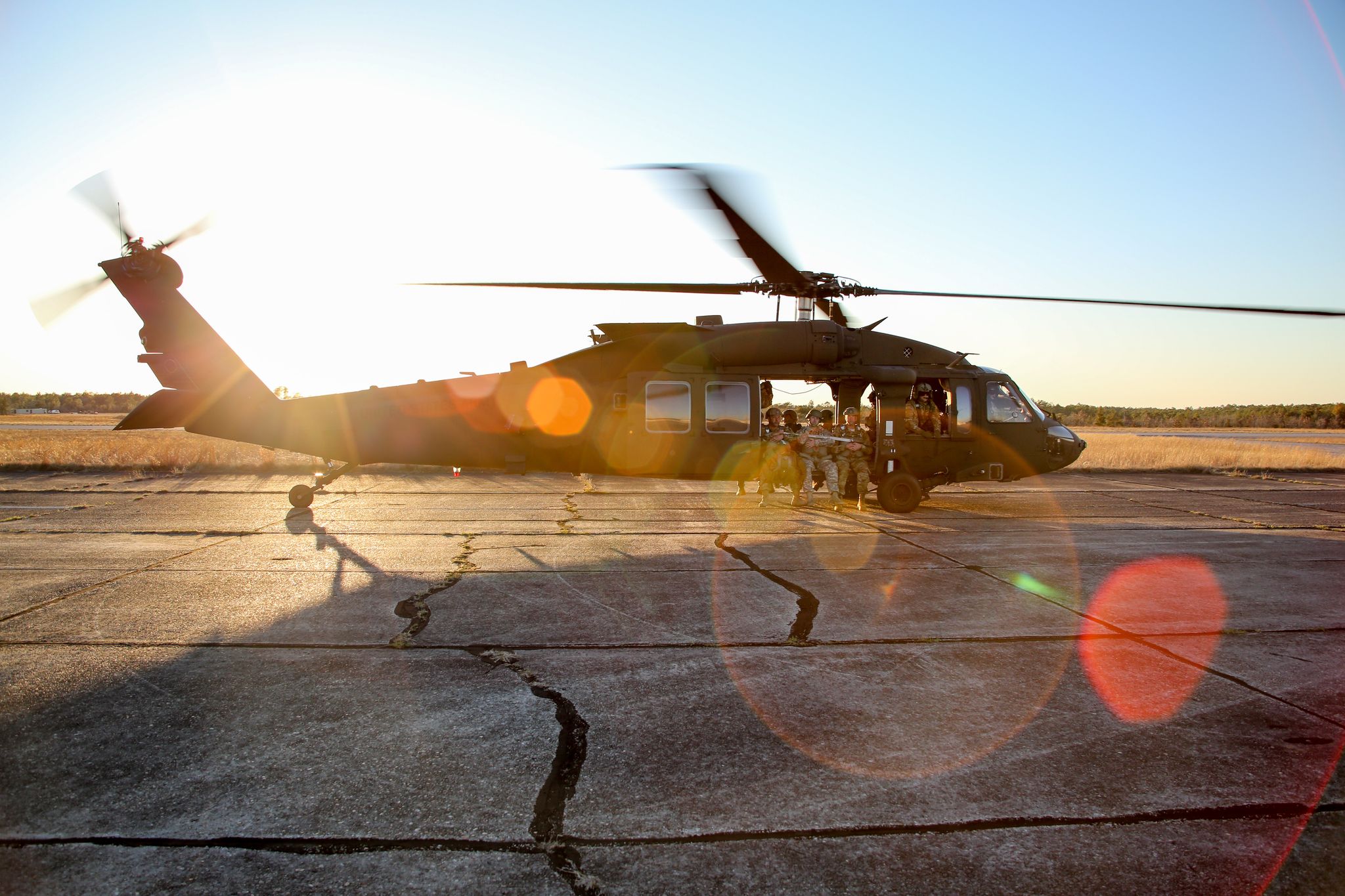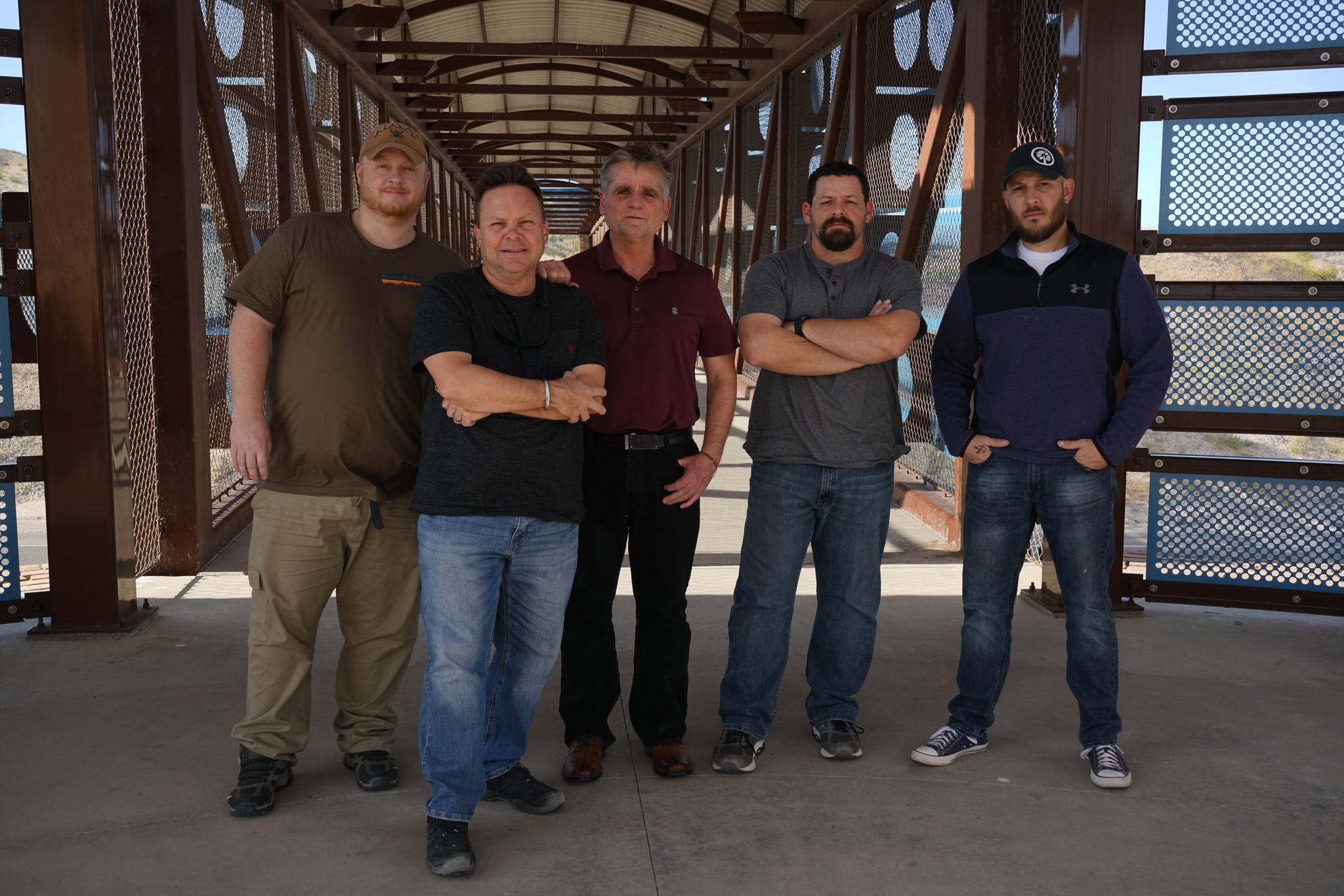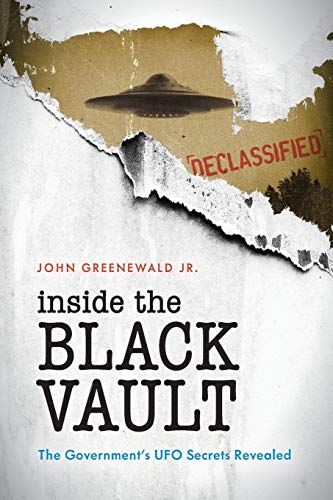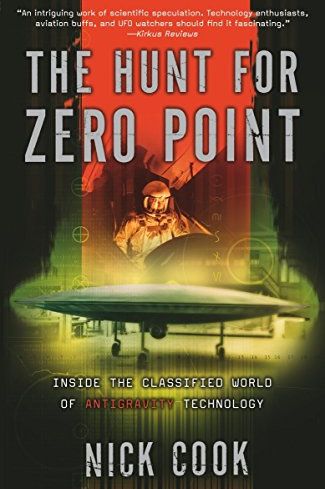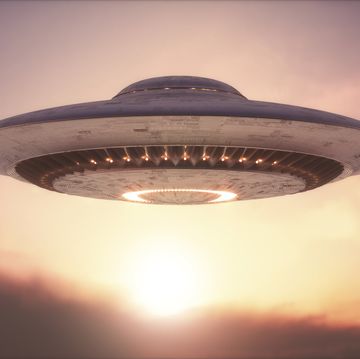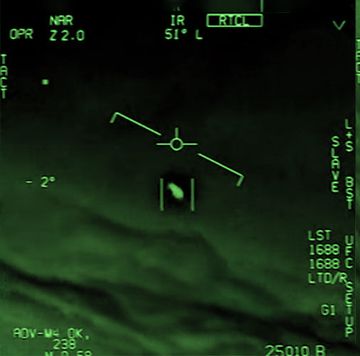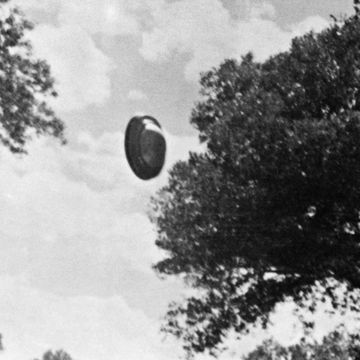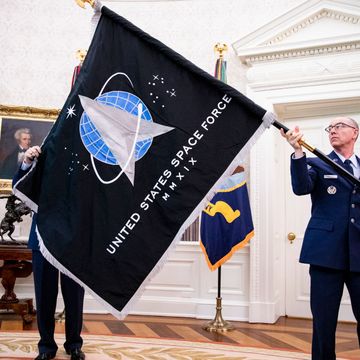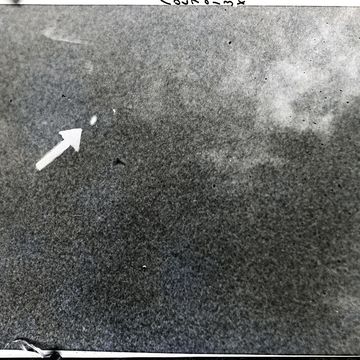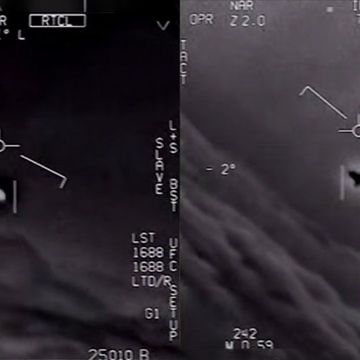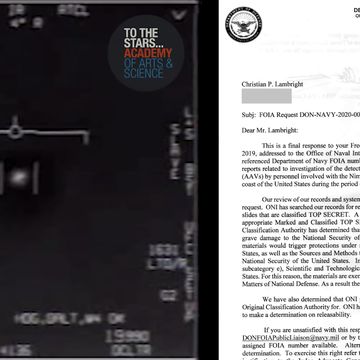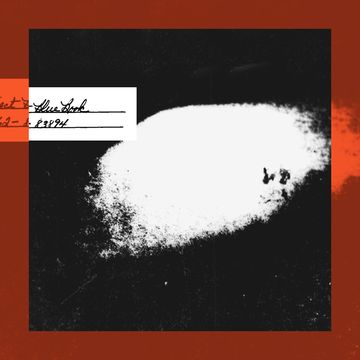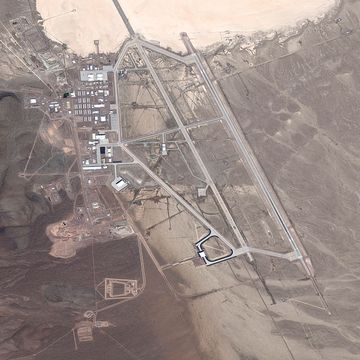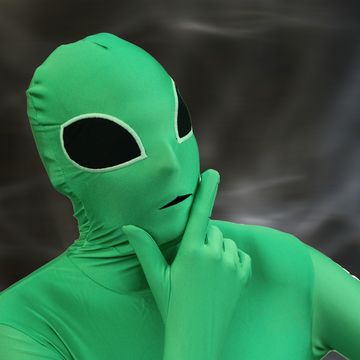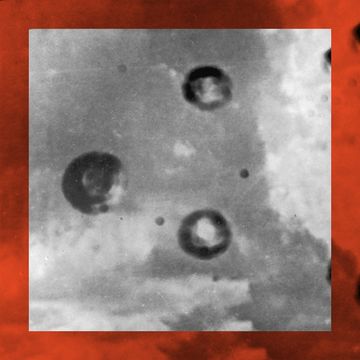The five men share an easy rapport with each other, playfully ribbing one another while also communicating a deep sense of mutual respect. It’s clear they all share the bond of having once served in the armed forces. Yet for Gary Voorhis, Jason Turner, P.J. Hughes, Ryan Weigelt, and Kevin Day—assembled together in a private group chat by Popular Mechanics—something much bigger ties them together beyond simply serving in the U.S. Navy.
These men also share a connection of being witnesses to one of the most compelling UFO cases in modern history: the Nimitz UFO Encounters, an event that the Navy recently confirmed indeed involved “unidentified aerial phenomena.”
Largely overshadowed by a grainy black-and-white video, and a former Topgun fighter pilot eyewitness, these veterans offer new and intriguing details on what occurred with the Navy’s Strike Carrier Group-11 as it sailed roughly 100 miles off the Southern California coast in 2004—details that a former career intelligence agent who investigated the Nimitz Encounter while at the Pentagon can neither confirm, deny, or even discuss with Popular Mechanics.
Ultimately, these five men—the “other” Nimitz witnesses—could be key to understanding an event that a leading aviation defense expert says “likely wasn’t ours.”
So whose was it?
The Intercept
Stationed on the USS Princeton, a Ticonderoga-class guided missile cruiser, as the Nimitz carrier group went underway in early November 2004 for a routine training exercise, this would be the last time former Petty Officer 3rd Class Gary Voorhis would set sail aboard a Navy vessel.
Having already done almost six years in the Navy, including two combat tours, Voorhis was ready to transition to life outside the world of passionless grey metal hulls and vast leavening seas.
“The group was going to be deploying in a few months and there was a bunch of new systems, like the Spy-1 Bravo radar,” Voorhis tells Popular Mechanics. “It was really about getting all the kinks out.”
While chatting with some of the Princeton’s radar techs, Voorhis says he heard they were getting “ghost tracks” and “clutter” on the radars. For Voorhis, the Princeton’s only system technician for the state-of-the-art Cooperative Engagement Capability (CEC) and AEGIS Combat System, news of these systems possibly malfunctioning was especially concerning.
Fearing the ship’s brand new AN/SPY-1B passive radar system was malfunctioning, Voorhis says the air control systems were taken down and recalibrated in an effort to clear out—what’s assumed to be false radar returns.
“Once we finished all the recalibration and brought it back up, the tracks were actually sharper and clearer,” Voorhis says. “Sometimes they’d be at an altitude of 80,000 or 60,000 feet. Other times they’d be around 30,000 feet, going like 100 knots. Their radar cross sections didn’t match any known aircraft; they were 100 percent red. No squawk, no IFF (Identification Friend or Foe).”
Sitting in the Princeton’s Combat Information Center (CIC), Operations Specialist Senior Chief Kevin Day was tasked with the critical role of protecting the airspace around the strike group. “My job was to man the radars and ID everything that flew in the skies,” Day said in the documentary film The Nimitz Encounters.
On or around November 10, 2004, roughly 100 miles off the coast of San Diego, Day began noticing strange radar tracks near the area of San Clemente Island. “The reason why I say they’re weird [is] because they were appearing in groups of five to 10 at a time and they were pretty closely spaced to each other. And there were 28,000 feet going a hundred knots tracking south,” Day said in the documentary.
In another YouTube clip, Ryan Weigelt, the former Leading Petty Officer and power plant specialist for the SH-60B “Seahawk” helicopter, recalled the tone aboard the missile cruise at the time.
“Senior Chief Day, his name, was being called over the comms, no bullshit, every two minutes.” Weigelt said. “I recall hearing something, like a big, real-world scenario was going on, but I just didn’t really understand.”
While Day and the Princeton’s air traffic controllers continued to monitor the strange radar returns, Voorhis says he began to take the opportunity to use the ship’s advanced tracking systems to catch a glimpse of whatever these objects were.
“When they’d show up on radar,” Voorhis says, “I’d get the relative bearing and then run up to the bridge and look through a pair of heavily magnified binoculars in the direction the returns were coming from.” Describing what he saw during the daytime, Voorhis says the objects were too far off to make out any distinguishing features, however, he could clearly see something moving erratically in the distance.
“I couldn’t make out details, but they'd just be hovering there, then all of a sudden, in an instant, they’d dart off to another direction and stop again,” Voorhis says. “At night, they’d give off a kind of a phosphorus glow and were a little easier to see than in the day.”
By November 14, the strange returns had been continuously showing up for close to a week. With an air defense exercise scheduled for that morning, Day convinced his commanding officer to let him direct aircraft to attempt an intercept of these anomalous radar returns. Day’s decision led the VFA-41 Squadron Commander David Fravor to encounter what an “unofficial executive summary” later described as “an elongated egg or a ‘Tic Tac’ shape with a discernible midline horizontal axis” of approximately 46 feet in length.
With the intercept too far away for even high-powered binoculars, Voorhis, Day, and the rest of the Princeton could only listen to the live communications chatter, as the unidentified craft effortless evaded the two fighter jets by demonstrating “an advanced acceleration, aerodynamic, and propulsion capability.” Outmaneuvered by an object that’s colloquially become known for its shape as the “Tic Tac,” Fravor and his wingman returned to the USS Nimitz.
In a subsequent flight by another F/A-18, thanks to a state-of-the-art ATFLIR targeting pod, Lt. Chad Underwood would successfully capture video of the “Anomalous Aerial Vehicle,” or “AAV.”
For 13 years, the incredible story of the U.S. Navy being harassed and outperformed by UFOs went largely unknown by the greater public. However, in December 2017, after To the Stars Academy of Arts & Science—a verbosely named UFO think tank founded by former Blink-182 frontman Tom DeLonge—and the New York Times published a 1:16 clip of the ATFLIR video, the world suddenly became very familiar with the “Nimitz encounters.”
What hasn’t been discussed, however, is what the Nimitz’s enlisted witnesses say happened after the now famous intercept with the “Tic Tac.” Their testimony raises many more questions, debate, and even some controversy.
The Mystery
Like many of the other sailors aboard the USS Princeton, former Petty Officer 3rd Class Jason Turner knew something was up, but didn’t exactly know what had been going on inside the CIC. It was only during a chance encounter while delivering supplies to the ship’s Signal Exploitation Space that Turner found himself being another unwitting witness to the Nimitz’s UFO event.
A video playing on one of the console monitors immediately caught Turner’s eye. In it, the “Tic Tac” performed a number of seemingly impossible maneuvers, not seen in the brief clip released in 2017. Turner described what he saw in the Nimitz Encounters documentary:
“This thing was going berserk, like making turns. It’s incredible the amount of g forces that it would put on a human. It made a maneuver, like they were chasing it straight on, it was going with them, then this thing stopped turning, just gone. In an instant. The video you see now, that’s just a small snippet in the beginning of the whole video. But this thing, it was so much more than what you see in this video.”
Even now, Turner still appears visibly disturbed by whatever it is he saw that day. “I asked a good friend of mine who worked in that area, is this the training we’re going through?” he tells Popular Mechanics.
“No,” the friend replied. “This is real life.”
Equally by chance, during the time of the now-famous intercept, after being called to have a conversation with another detachment, Ryan Weigelt found himself inside the Princeton’s CIC. According to Weigelt, a video of an F/A-18 trying its best to catch the elusive “Tic Tac” was playing on the monitors. Like Turner, Weigelt says what he saw was a lot longer than the brief clip released in 2017.
“I was in there for quite a while and it was on the screen the whole time. I could not tell you how long, but it was playing when I went into combat and it was playing when I left,” Weigelt said in a YouTube interview.
Voorhis tells Popular Mechanics that he, too, saw a much longer and clearer version of the ATFLIR video through the ship’s Top Secret LAN network. “I definitely saw video that was roughly 8 to 10 minutes long and a lot more clear,” Voorhis says.
Did what he saw resemble any type of conventional aircraft?
“Umm, no!” he says with a laugh. “In the video I saw, you got a good sense of how the pilot was having a difficult time trying to keep up with this thing. It kept making tight, right angle turns.”
The most shocking claim these Navy veterans make is in what they say happened with all the data tapes for the various systems that recorded these UFO events.
The Visitors
Miles away from Voorhis, Day, Turner, and Weigelt, on the deck of the USS Nimitz aircraft carrier, Petty Officer Patrick “PJ” Hughes was unaware of the unidentified objects the Carrier group had been dealing with for the past several days. Instead, as an aviation technician, one of Hughes’ jobs was to secure the hard drive data recorders from the airborne early-warning aircraft, the E-2 Hawkeye.
“We call them bricks, but they contain the software to run the airplane and they also record or can record a lot of the data that the air crew sees during the flight,” said Hughes in a YouTube interview.
On November 14, as Hughes performed this routine task, he was unaware that the E-2 hard drives he was securing away in a classified safe had just come from the Hawkeye that Day first tried to use to intercept the mysterious UFOs.
Shortly after securing the data bricks, Hughes said he was visited by his commanding officer and two unknown individuals. “They were not on the ship earlier, and I didn’t see them come on. I’m not sure how they got there,” said Hughes of the two men.
According to Hughes, his commanding officer told him to turn over the recently secured harddrives. “We put them in the bags, he took them, then he and the two anonymous officers left,” Hughes said.
Inside the Princeton, Voorhis had a similar encounter. “These two guys show up on a helicopter, which wasn’t uncommon, but shortly after they arrived, maybe 20 minutes, I was told by my chain of command to turn over all the data recordings for the AEGIS system,” says Voorhis.
In addition to turning over his data tapes, Voorhis says he was told by this chain of command he needed to reload the recorders for the ship’s advanced Combat Engagement Center (CEC) because it had also been wiped clean, along with the optical drives with all the radio communications. “They even told me to erase everything that’s in the shop—even the blank tapes.” Voorhis says the only other time he can recall having to turn over his tapes like this was after an aircraft crash during one of his combat deployments.
Up on the Princeton’s flight deck, Weigel says the two men initially arrived on the Princeton via helicopter, wearing generic flight suits. According to Weigelt, the men boarded one of his detachment’s SH-60B helicopters and flew off for a time before returning with “a bunch of bags.” Weigelt says the two men retired to the “Admiral’s Quarters”on the Princeton and a guard was staged outside of the door.
The Doubter
In a January interview on The Fighter Pilot Podcast, Cmdr. David Fravor told fellow retired F/A-18 pilot and host Vincent Aiello that the squadron’s video tapes of the “Tic Tac” intercept had mysteriously vanished. Fravor said he believes it’s likely the tapes were inadvertently recorded over.
“You know how it is when you go to and from cruise,” Fravor said. “Someone goes, ‘What are these? Hey, they look like blank 8mm tapes. We’ll just use them.”
In an interview with Popular Mechanics, Aiello detailed the processes for securing flight tapes as Fravor mentioned. Though these materials are classified, a number of different qualified squadron personnel would have access to the safe where the tapes would have been kept.
“It’s very common, even for tapes you’ve marked and want to save, to inadvertently get put back into circulation, handed out, and recorded over,” Aiello says. “I think Cmdr. Fravor’s opinion on how the tapes went missing is the most plausible explanation. However, a lot of squadron personnel have access to those materials, so it leaves the door open that someone could have intentionally taken them.”
Though Fravor has acknowledged the disappearance of data records, the Nimitz’s most well-known witness has equally pushed back on some of the enlisted sailor’s accounts.
Speaking at the McMenamin’s UFO festival this past May, Fravor admonished some of the “other witness” accounts, saying only the four pilots involved ever personally saw the “Tic Tac,” that no one was asked to sign non-disclosure agreements [NDA], and that “men in suits” never showed up on the ships.
During an October appearance on Joe Rogan’s podcast, Fravor said, “There’s still groups of people making stuff up, like someone came out on ours and was talking about, he’s like, I saw the whole video, the whole video is like 10 minutes long and it was doing all this. That’s bullshit.”
Fravor told Rogan that he was one of the top 20 highest ranking members of the carrier group, and had there been any kind of formal investigation, he’d have known about it.
“Okay, I’ll give you credit, if they did, why wouldn’t they show up and talk to the guys who witnessed it, chased it, and one of the senior guys in the battle group?” Fravor asked.
Voorhis claims that in the days prior to the intercept, he witnessed indistinct objects far in the distance. But regarding Fravor’s intercept, he says, “His intercept? Nope, we were too far away, plus I would not have known about it or the bearing of it. Just that it was happening.”
None of the witnesses Popular Mechanics spoke with claimed they’d seen Fravor’s intercept of the unknown object.
In The Nimitz Encounters documentary, Hughes said a friend and aircrew member on one of the E-2 Hawkeye aircraft told him he had to sign an NDA about the incident. Since the E-2 planes would have been in Carrier Wing Nine’s Airborne-Early Warning Squadron VAW-117 (“The Wallbangers”), and not strike fighter squadron under Fravor’s command, the possibility exists that the E-2’s squadron commander could have issued an NDA to their crew without Fravor’s knowledge. However, Popular Mechanics has not verified what Hughes was told. None of the witnesses we spoke with claimed they had signed an NDA.
The Nimitz’s enlisted witnesses stand by their claims that two unknown officials showed up shortly after the UFO incidents. However, they don’t describe them as being the sinisterly sounding “Men in Black,” as Fravor has implied.
According to Weigelt, it wasn’t at all uncommon to have people coming and going that weren’t stationed on the ships. For him, it was only when he heard Voorhis’ and Hughes’ accounts that the arrival of the two individuals on the Princeton seemed to become related to the UFO events.
“I just knew they were there for a reason, to do something they have to do, and just stay the hell out of their way,” Weigelt said.
“Squadron aircrew wouldn’t normally be notified if the ship’s radar or other information was being used for an investigation,” says Guy Snodgrass, a former F/A-18 pilot, Topgun instructor, and communications director for former Secretary of Defense Gen. James Mattis.
While Snodragss wouldn’t comment directly on the UFO event, he said he served alongside the weapons systems officer inside Fravor’s plane during the intercept.
“He’s a talented weapons systems officer (WSO) who has dedicated himself to the naval aviation profession,” Snodgrass says about the pilot, who has never spoken publicly and Popular Mechanics is choosing not to name, as he is still serving in the U.S. Navy. “He also has the acumen to correctly characterize anything out of the ordinary that he might have seen, so I would bias towards giving his account more, not less, weight.”
The Defenders
While investigating these claims, Popular Mechanics was able to locate and speak to a previously unknown witness who was with the Nimitz carrier group in 2004. Unaware of some of their fellow shipmates previously coming forward, and out of concerns related to security oaths, the witness agreed to speak only under the condition of anonymity.
“I do remember the events of 2004 very well,” says the witness, who at the time was an Operations Specialist aboard the USS Princeton. “The decision was made to scramble two fighter jets to investigate. From what the pilots described, the movement of the UFO was defying the laws of physics.”
Popular Mechanics didn’t provide the witness with any of the previous claims.
“What really made this incident alarming was when a Blackhawk helicopter landed on our ship and took all our information from the top secret rooms,” the witness says. “We were all pretty shocked and it was an unspoken rule not to talk about it because we had secret clearances and didn’t want to jeopardize our careers.”
Regarding whether or not there was originally a longer recording than the infamous UFO intercept, Aiello says that’s “entirely possible.”
“The 8mm tapes in use at the time had two hours of recording time, and it was not uncommon for aircrew to leave it on for most of the flight,” Aiello says. “It’s plausible that they simply recorded a short segment of the tapes down in CIC, but that the rest of the tapes were available … up until they were either recorded over or whatever happened.”
Aiello, who was on the Nimitz aircraft carrier in 2004 but was assigned to another strike-fighter squadron, says he doesn’t have any direct information on the incident, but he’s willing to offer his opinion based on his experience as a military fighter pilot for over 20 years.
The enlisted witnesses say it’s disappointing to hear Fravor suggest some of their accounts are inaccurate. However, they all stand by their experiences, and equally support Fravor’s account. For them, they say the only reason they ever came out with their story was to support Fravor and their fellow sailors. “That’s what it’s always been about since day one,” Turner says.
But even if Fravor isn’t buying the witnesses’ stories, that doesn’t mean others don’t believe.
“The combination of those aviators, the Princeton Aegis Radar operators, and the E-2 crew convinced me beyond a doubt of the veracity of the story,” says Paco Chierici, a former F-14 pilot, author of Lions of the Sky, and the person credited with first sharing the news of the Nimitz event in a 2015 Fighter Sweep article. “I know those people and how that world works. There is no way it could have been fabricated or misinterpreted.” (Fravor did not respond to several requests for an interview.)
To be clear, the only Nimitz witness Chierici personally knows is Fravor. “But,” he says, “I know these people. I worked and lived with them for 20 years, operating at very high tempos and stress levels. They’re all, from the enlisted radar operators, to the squadron COs, incredibly professional and competent. The absolute best at what they do.”
The Truth...
By the Nimitz’s “other” witnesses’ accounts, there’s overwhelming evidence to suggest someone was very interested in this event when it occurred. Since none of the witnesses or pilots involved say they were ever interviewed at the time, it appears the most significant concern for the witnesses was the ship’s electronics data. What this data reveals, however, remains a mystery.
Popular Mechanics spoke with the man who says he investigated UFOs while working for the Office of the Under Secretary for Defense for Intelligence: Luis Elizondo. When asked about the existence of a longer video than what’s been publicly released, Elizondo—who now serves as the Director for Global Security and Special Programs for To the Stars Academy—says, “Unfortunately, I’m unable to comment at this time as to what is in the possession of the U.S. government.”
Elizondo simarily parried additional questions about the missing electronic data, saying only, “A comprehensive investigation was conducted, including various data sources, in which conclusions remain in the providence of the U.S. government.” On whether or not other non-Navy sources were used during this investigation, Elizondo says he was “unable to confirm or deny any information as it relates to coordination with other U.S. Government elements.”
As for whether or not other data sources (which may or may not exist) helped influence the Navy’s public stance that these objects are still “unidentified,” Elizondo is coy. “It is certainly plausible,” he says, “in addition to the other numerous reports by pilots in the U.S. Navy.”
And as far as why other data may be being withheld from public release, Elizondo says this could have more to do with what was used than what was actually recorded.
“Many of the systems and the manner in which data is collected remains classified in order to protect tactics, techniques, and procedures,” says Elizondo. “I am not at liberty to discuss any of those systems.”
Elizondo says he would “absolutely” encourage other military witnesses to come forward with their accounts. “Many of our service members are highly trained observers,” he says. “Data obtained by these types are always considered valid observations, although the nuances may not be immediately known.”
Nick Cook, the former aviation editor for Jane’s Defense Weekly, says there are a number of reasons why personnel might have boarded ships and seized electronic data. “It could mean it was sensitive information,” he says. “It could mean this was an exercise.”
Regarding the latter possibility—that this was a secret military test of some sort—Cook, a career defense journalist, says in his opinion it was unlikely this was a classified test. “It’s not impossible, but I wouldn’t think it’s likely. It would be so against the norm of my experience with how the black world conducts testing.”
Having spent a decade investigating the potential for secret highly advanced aerospace technology, and publishing these efforts in The Hunt for Zero Point, Cook was cautious in offering any definite conclusions as to what the Nimitz carrier group had encountered. Cook says it’s possible, but not likely, that the “Tic Tac” was some type of classified drone.
“I searched for 10 years, and never found any compelling evidence that the type of technology exists,” Cook says. “[That] doesn’t mean it couldn’t still exist … I just never found any smoking gun for it.”
But when pushed, the career aviation journalist soberly says, “In the balance of probabilities, I don’t think it’s ‘ours’.”
Tim McMillan is a retired police Lieutenant and intelligence analyst from Savannah, Georgia. To satisfy his love for solving mysteries, Tim now works as an investigative journalist—examining any question worth answering.
